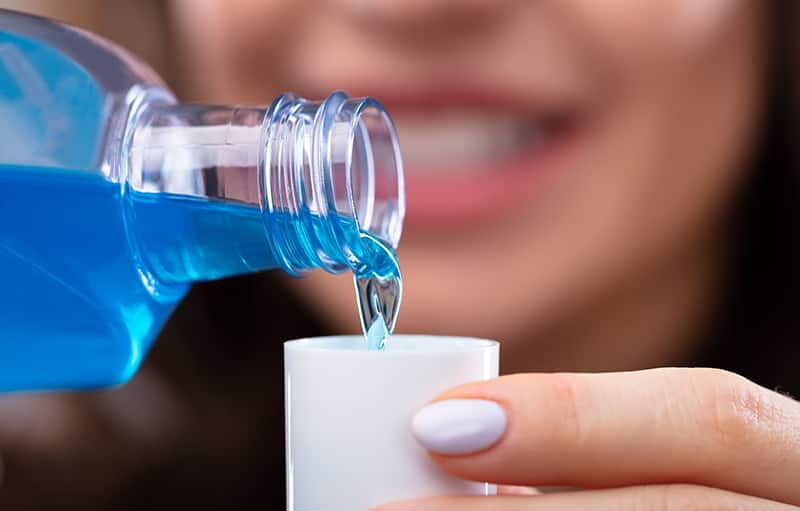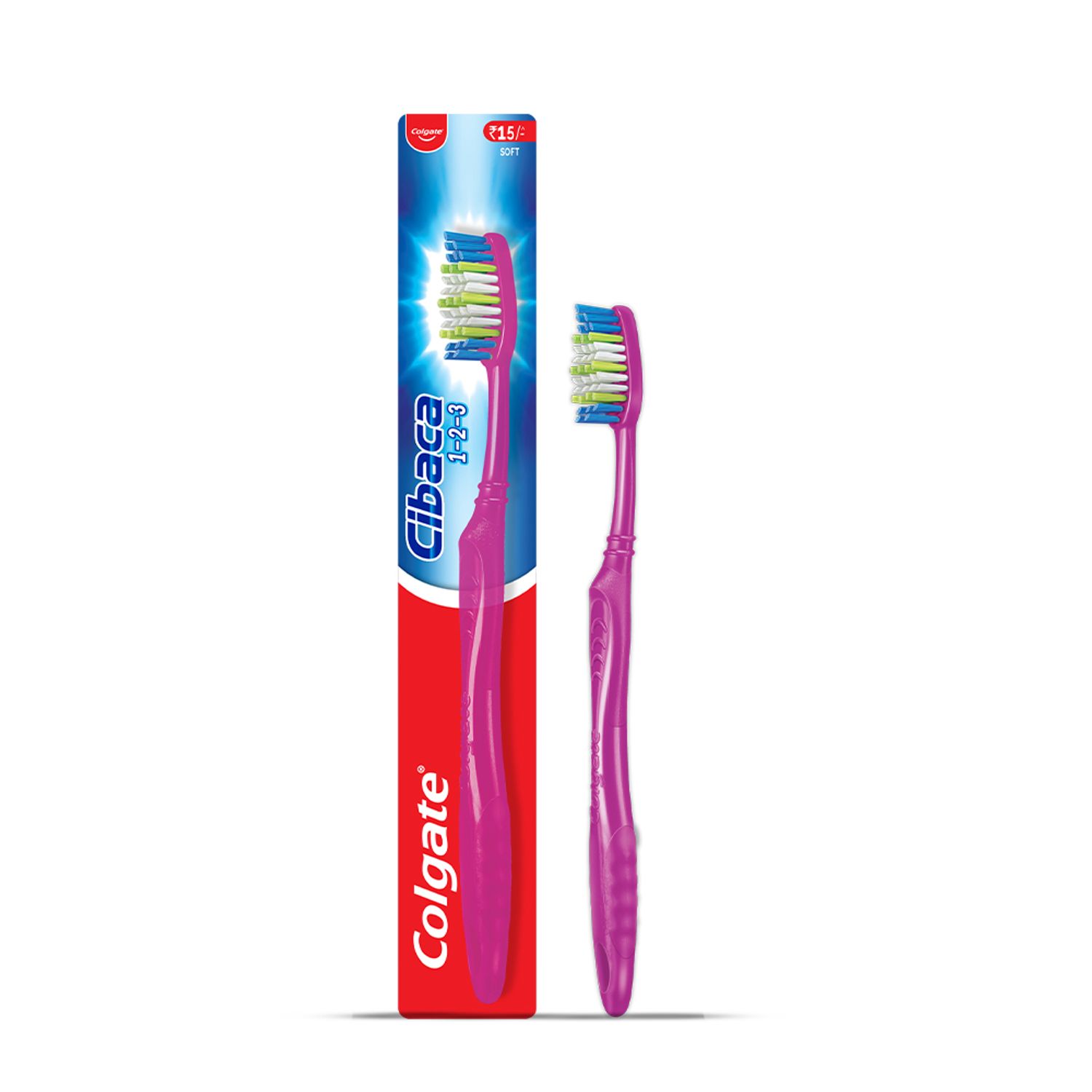Types of Mouthwash
When it comes to mouthwash, broadly speaking, there are two main types of mouthwashes: therapeutic and cosmetic.
- Therapeutic mouthwashes: These types of mouthwash usually contain active ingredients that fight off harmful bacteria, helping to reduce plaque, gingivitis, cavities, and bad breath. If they have fluoride, they can also help prevent tooth decay.
- Cosmetic mouthwashes: These may temporarily control or reduce bad breath and leave a pleasant taste in your mouth, but they do not help prevent cavities or gum disease.
Benefits of Mouthwash
While mouthwash is commonly known for its ability to freshen breath, adding it to your daily oral care routine can provide many other benefits too. Here are some of the major benefits of mouthwash:
Freshens Breath
One of the most immediate benefits of using mouthwash is fresher breath. Mouthwash can help mask bad breath and leave your mouth feeling clean and refreshed, giving you a sense of oral cleanliness and comfort throughout the day.
Reduce Plaque
Mouthwash can help reduce plaque buildup on your teeth, a sticky film of bacteria that can lead to tooth decay and gum disease. By swishing with mouthwash, you can reach areas of your mouth that may be difficult to clean with a toothbrush or floss alone.
Prevents Gingivitis
Gingivitis is a common gum disease that causes swollen and bleeding gums. It can be uncomfortable and may lead to more serious oral health issues if left untreated. Fortunately, certain mouthwashes can help by killing germs and reducing inflammation in the gums. Incorporating these mouthwashes into your oral care routine can help prevent or alleviate gingivitis symptoms and maintain healthy gums for a brighter smile.
Prevents Cavities
Mouthwashes containing fluoride help strengthen the outer layer of your teeth, called tooth enamel, which is your teeth’s shield against cavities. Mouthwash with fluoride helps repair and rebuild weakened enamel, making it tougher and more resistant to harmful acid attacks from bacteria, acidic foods, and drinks. So, using mouthwash regularly can help in your dental care to keep your teeth strong and cavity-free.
Promotes Overall Dental Health
Adding mouthwash to your daily oral care routine is like giving your teeth and gums extra care. It works alongside brushing and flossing to reach all those areas in your mouth that might get missed by other methods.
If you are looking for a mouthwash to boost your oral hygiene routine, you may try Colgate Maxfresh Freshmint Splash Mouthwash. With its alcohol-free formula, it gives you a refreshing kickstart to your day and an intense burst of freshness. Plus, it offers 10 times longer cooling with its peppermint flavour. Not only that, but it also removes 99% of germs, leaving your mouth feeling clean.
How to Use Mouthwash?
After brushing their teeth with toothpaste, you can pour the prescribed amount of mouth rinse into a measuring cup or cap. You can then swish or gargle it vigorously between their teeth for about a minute, ensuring it reaches every nook and corner, including along the gumline. Afterwards, simply spit out the rinse, being careful not to swallow it.
Following the swishing session, it is a common practice to avoid eating or drinking for the next 30 minutes, allowing the active ingredients in the mouthwash to work. This precaution ensures that the benefits of mouthwash can fully take effect, contributing to overall oral health. By following these steps on how to use mouthwash, you can maintain their oral health, ensuring a fresh and clean feeling throughout the day.
When to Use Mouthwash: Before or After Brushing?
When you first add mouthwash to your oral care routine, you may wonder, should you use mouthwash before or after brushing? Typically, this question does not have a direct answer as the scientific research is limited and reputable organisations offer different recommendations.
According to the Indian Dental Association, when used in conjunction with a regimen of effective tongue cleaning, tooth brushing, and flossing, mouthwash can play a role in the treatment of bad breath (halitosis). However, other studies recommend avoiding mouthwash right after brushing, since this may wash away the fluoride from your toothpaste. Some studies also advise that one may choose to use mouthwash before or after brushing based on personal preference. The best thing to do is to check the label on your mouthwash to see what the manufacturer recommends on when to use mouthwash for the best results.
Precautions and Side Effects
Mouthwash can be helpful in maintaining good oral hygiene, but it is vital to use it correctly and carefully. If you already have healthy gums and teeth, using mouthwash when it is not needed may cause problems like allergic reactions or changes in the good bacteria in your mouth, which could affect your overall health.
Always check the seal on the bottle before using it, and never swallow mouthwash. If you have any underlying health issues, seek advice from your healthcare professional before using mouthwash. If your mouth feels weird or you experience any discomfort after using mouthwash, stop using it immediately and consult your dental professional right away.
In conclusion, understanding which mouthwash to use and how to use mouthwash correctly can significantly enhance your oral care routine. By selecting the appropriate mouthwash for your needs and following proper usage guidelines, such as swishing for a recommended duration after brushing, you can effectively reduce plaque, prevent gum disease, and promote overall dental health. Remember, mouthwash is a valuable addition to your oral hygiene routine, but it should complement and not replace regular brushing and flossing habits. So, take a step towards healthier teeth and gums today by incorporating the right mouthwash into your daily routine.
Frequently Asked Questions
- Can I use mouthwash before brushing?
Certain studies suggest that you may choose when to use mouthwash, before or after brushing, based on your personal preference. That said, mouthwash manufacturers may recommend an order based on their product's ingredients, so check the label on your product to ensure that you maximise its effects. - Do I rinse after mouthwash?
You do not need to rinse your mouth with water after using mouthwash. But if you are worried about any leftover mouthwash, you can rinse your mouth lightly with water. Just be careful not to rinse too much, or you might wash away the helpful ingredients and lessen the benefits. - Should I wait to brush after using mouthwash?
Some studies suggest that it is best to avoid using mouthwash immediately after brushing your teeth, as this could wash away the fluoride from your toothpaste. Instead, these studies recommend using mouthwash at a different time of day to maximise its benefits. - What is the difference between oral rinse and mouthwash?
While both serve the purpose of rinsing the mouth, mouthwash typically contains specific ingredients like fluoride or antibacterial agents for oral health, offering the benefits of mouthwash. On the other hand, oral rinse can refer to any liquid used to rinse the mouth, including homemade or natural solutions. Consult your dental hygienist to choose the right one for your needs.
This article is intended to promote understanding of and knowledge about general oral health topics. It is not intended to be a substitute for professional advice, diagnosis or treatment. Always seek the advice of your dentist or other qualified healthcare provider with any questions you may have regarding a medical condition or treatment.
ORAL HEALTH QUIZ
What's behind your smile?
Take our Oral Health assessment to get the most from your oral care routine
ORAL HEALTH QUIZ
What's behind your smile?
Take our Oral Health assessment to get the most from your oral care routine













